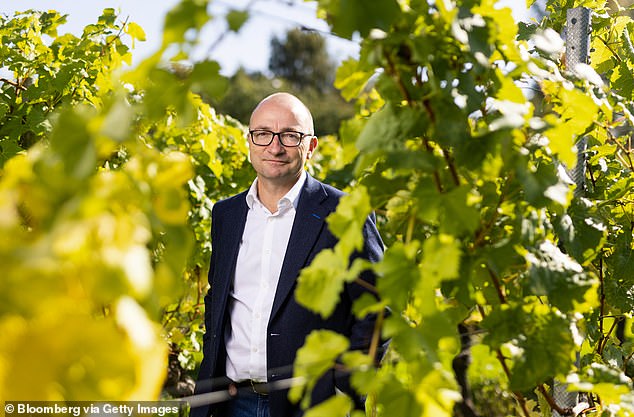Table of Contents
Britain’s biggest wine producer could sell itself as it tries to meet growing demand for English fizz.
Chapel Down has launched a strategic review to explore ways to find new funding to pay for its ambitious growth plans.
Options include raising money from existing or new investors, or even putting up a “for sale” sign above its Kent headquarters in Tenterden.
It is understood that Chapel Down’s board would be open to a range of buyers, from private equity groups and champagne houses to wealthy individuals.
The company has enjoyed great success in recent years as the appetite for English sparkling wine increases.
Growth plans: Chapel Down, led by chief executive Andrew Carter (pictured), has launched a strategic review to explore ways to find new funding.
The group, created in 2002, sold a record 887,000 bottles last year, with profits rising 87 per cent to £2.3m.
It has been publicly traded since 2003 but joined AIM in December in what chief executive Andrew Carter said was part of the company’s “evolution” from “a start-up to becoming the largest and leading winemaker.” from England”.
The board, which includes city tycoon and Conservative Party donor Lord Spencer, who is Chapel Down’s largest shareholder with a 26 per cent stake, is driving a strategic review to cement “long-term profitable growth “.
Chapel Down already has plans for new vineyards and a winery, as well as a major investment in its headquarters.
The site has been a big source of income and welcomed 65,000 tourists last year for wine tastings and guided tours.
Chapel Down – whose bottles of English sparkling wine start at £30 – has around a tenth of the UK’s 10,000 hectares of vineyards.
Although 95 per cent of Chapel Down is consumed in the UK, the company is keen to expand overseas.
Carter told the Mail last year that the US market is of particular interest thanks to America’s love of all things British.
A Chapel Down spokesman said yesterday: “The board believes it is now appropriate to review the full range of long-term funding options underpinning this scheme.”
And analysts seemed to agree with this assessment.
Russ Mold, of broker AJ Bell, said: ‘Chapel Down has made a name for itself over the years but the business appears to have peaked in terms of scale.
To grow further, it really needs a lot of cash to invest in the business and it would be better if it came from a new, larger owner, rather than handing over capital to shareholders on an ad hoc basis.
Wine is the fastest growing agricultural sector in the UK, with business booming at companies such as Chapel Down and rivals Nyetimber and Gusbourne.
The calcareous soil of southeast England is similar to that of the Champagne region of France.
Warmer temperatures in recent years have meant higher sugar content in grapes, leading to higher alcohol levels.
Taittinger became the first champagne house to invest in English sparkling wine in 2015, when it snapped up land near Chilham in Kent.
LVMH, the company behind the world’s leading champagne brands Moet & Chandon and Veuve Clicquot, has also been studying plots on British soil.
Aside from Kent, West Sussex and East Sussex are also becoming key pillars of the growing English wine market, where the process from planting a vine to pouring a glass of bubbles takes at least seven years on average.
DIY INVESTMENT PLATFORMS

AJ Bell

AJ Bell
Easy investing and ready-to-use portfolios

Hargreaves Lansdown

Hargreaves Lansdown
Free Fund Trading and Investment Ideas

interactive inverter

interactive inverter
Fixed fee investing from £4.99 per month

eToro

eToro
Stock Investment: Community of over 30 million

Trade 212

Trade 212
Free stock trading and no account fees
Affiliate links: If you purchase a This is Money product you may earn a commission. These offers are chosen by our editorial team as we think they are worth highlighting. This does not affect our editorial independence.
Compare the best investment account for you


